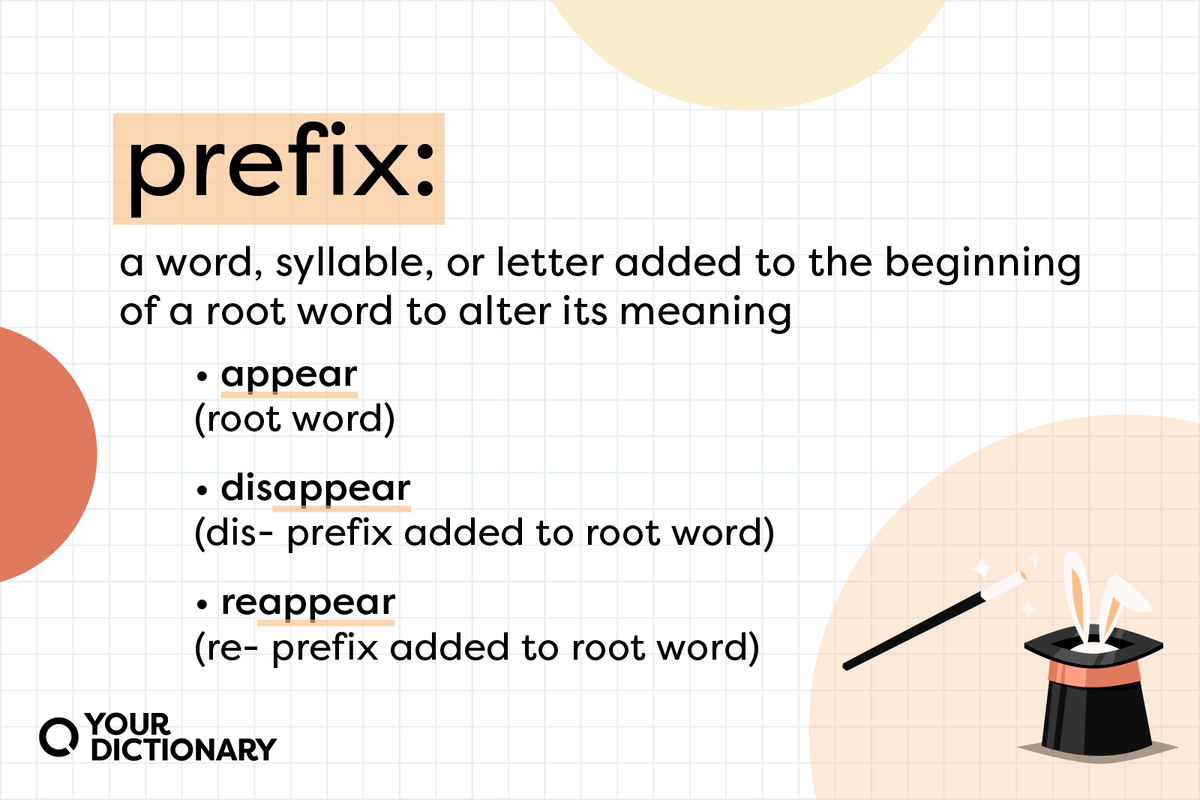
How do you turn disappear into reappear? It’s not a magic trick — it’s just a matter of changing the prefix. Prefixes may only be a few letters long, but they have the power to completely shift the meaning of a word, and even create a new word altogether.
What Is a Prefix?
A prefix is a word, syllable, or letter added to the beginning of a root word to alter its meaning.
For example, in the word disappear, dis- means “do the opposite,” and the root word -appear means “to be visible.” Disappear means “opposite of being visible” — to no longer be seen.
When you change the prefix of a word, you can change the word’s meaning — or even the meaning of the whole sentence.
- The magician made the rabbit disappear. (The rabbit vanished.)
- The magician made the rabbit reappear. (The rabbit became visible again.)
- I feel transformed after my trip to the spa. (The spa changed me.)
- I feel informed after my trip to the spa. (I learned something after going to the spa.)
- Paul reported the criminals to the police. (Paul told the police about the criminals.)
- Paul teleported the criminals to the police. (Paul used technology to instantly send the criminals to the police)
Prefix vs. Suffix: Start to Finish
Both prefixes and suffixes are types of affixes — words that you add to a root word to change its meaning.
While prefixes come at the beginning of a word (like disappear), suffixes come at the end of a word (as in disappearance). Both types of affixes are important in creating the meaning of a word.
Common Prefix Examples
Most prefixes come from Latin or Greek roots, and they appear in more words (and numbers) than you think.
|
Prefix |
Prefix Meaning |
Word Examples |
|
ante- |
before, prior to, front |
antebellum, antechamber, anterior |
|
auto- |
self, one's self, yourself |
autobiography, autograph, autonomy |
|
circum - |
around, go around |
circumnavigate, circumscribe, circumvent |
|
co- |
jointly, with, together |
coexist, copilot, coworker |
|
com- |
together, with |
commiserate, compartment, community |
|
con- |
with, together |
confound, confluence, conversation |
|
en- |
put into, surround |
encase, endow, envelope |
|
exo- |
out, outer |
exhale, extend, exoskeleton |
|
extra- |
beyond, more |
extracurricular, extraterrestrial, extravert |
|
hetero- |
different, not the same |
heterogeneous, heterosexual, heterocyst |
|
homo- |
same, not different |
homogenized, homophone, homosexual |
|
hyper- |
extreme, beyond |
hyperactive, hyperspace, hypertension |
|
inter- |
between, in the midst of, among |
intermittent, intersect, interstate |
|
mega - |
large, massive |
megaphone, megadose, megabyte |
|
micro- |
small, tiny |
microcosm, microphone, microscope |
|
mid- |
middle, midpoint |
midnight, midseason, midterm |
|
mis- |
incorrect, bad, wrongful |
misappropriate, misunderstand, misuse |
|
mono- |
one, singular |
monogamous, monotone, monochrome |
|
over- |
too much, excessive |
overcook, overdone, overwrought |
|
post- |
after |
postdate, postscript, post-war |
|
pre- |
before, prior to |
prefix, preliminary, preschool |
|
re- |
again, do over |
reconsider, re-evaluate, rewrite |
|
semi- |
partial, somewhat, less than fully |
semiconductor, semester, semi-retired |
|
sub- |
below, beneath |
subjugate, submarine, sub-par |
|
trans- |
across, change |
transfer, transgender, translate |
Prefixes That Mean “Not”
Several prefixes make the new word mean the opposite of the original meaning of the base word.
|
Prefix |
Prefix Meaning |
Word Examples |
|
a- |
lacking, without, not |
amoral, atheist, abiotic |
|
ab- |
away, removed, not |
abnormal, abstract, absent |
|
an- |
without, not, lacking |
anaerobic, anacoustic, anhydrous |
|
anti- |
against, opposing, contrary to |
antibiotic, antifreeze, antisocial |
|
contra- |
contrary to, against, opposing |
contraindicated, contralateral, contraflow |
|
counter- |
opposing, contrary to, against |
counterproposal, counteroffer, counter-attack |
|
de- |
reverse, undo, remove |
deactivate, de-ice, deplane |
|
dis- |
remove, separate, apart from |
disagree, disapprove, disconnect |
|
ex- |
away from, former, lacking |
ex-husband, ex-wife, ex-boss |
|
il- |
not, lacking, without |
illegal, illegible, illogical |
|
im- |
without, not, lacking |
impossible, improper, impermeable |
|
in- |
no, without, lacking |
injustice, incomplete, invisible |
|
ir- |
not, non, opposite |
irreversible, irreplaceable, irregular |
|
non- |
not, lacking, without |
nonexistent, nonfiction, nonnegotiable |
|
un- |
opposite, not, lacking |
unkind, unresponsive, unruly |
Wait, Do You Hyphenate Prefixes?
For the most part, you don’t need to hyphenate a prefix to its root word. However, there are a few times to use a hyphen when adding a prefix to a word.
- Always hyphenate the prefix self (as in self-esteem or self-confident).
- Hyphenate the prefix ex- when it means “former” (as in ex-wife or ex-boss).
- Hyphenate prefixes when the prefix ends with the same letter that the root word begins with (such as non-negotiable or re-establish).
- Hyphenate prefixes if they could be confused with compound words (such as re-cover to mean “cover again”).